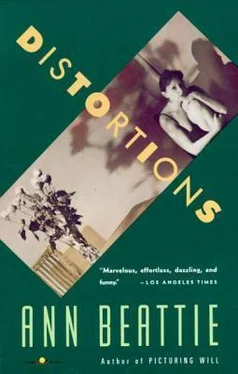Ann Beattie - Distortions
Здесь есть возможность читать онлайн «Ann Beattie - Distortions» весь текст электронной книги совершенно бесплатно (целиком полную версию без сокращений). В некоторых случаях можно слушать аудио, скачать через торрент в формате fb2 и присутствует краткое содержание. Год выпуска: 1991, Издательство: Vintage, Жанр: Современная проза, на английском языке. Описание произведения, (предисловие) а так же отзывы посетителей доступны на портале библиотеки ЛибКат.
- Название:Distortions
- Автор:
- Издательство:Vintage
- Жанр:
- Год:1991
- ISBN:нет данных
- Рейтинг книги:5 / 5. Голосов: 1
-
Избранное:Добавить в избранное
- Отзывы:
-
Ваша оценка:
- 100
- 1
- 2
- 3
- 4
- 5
Distortions: краткое содержание, описание и аннотация
Предлагаем к чтению аннотацию, описание, краткое содержание или предисловие (зависит от того, что написал сам автор книги «Distortions»). Если вы не нашли необходимую информацию о книге — напишите в комментариях, мы постараемся отыскать её.
Distortions — читать онлайн бесплатно полную книгу (весь текст) целиком
Ниже представлен текст книги, разбитый по страницам. Система сохранения места последней прочитанной страницы, позволяет с удобством читать онлайн бесплатно книгу «Distortions», без необходимости каждый раз заново искать на чём Вы остановились. Поставьте закладку, и сможете в любой момент перейти на страницу, на которой закончили чтение.
Интервал:
Закладка:
Sam’s question nags at her. Back at work on Monday, she thinks about calling Jim. She’s busy, though, and forgets to do it, or else when she remembers the phone is in use. By five o’clock she feels differently. Sam meant to be helpful, but he misunderstood. She regrets wasting so much of her day thinking about what he said. She regrets the weekend, too — Saturday was wasted; she had felt vaguely depressed all day, and now she realizes that Sam was responsible. Not only what he said about Jim — or what he insinuated, really — but his presence, a reminder of what can happen to a marriage, the distressing realization that two adults who care about each other, as Sam and his wife do, can’t reach some agreement, have some arrangement that will make them both happy.
A car coasts along beside her. She recognizes the driver, a man she has spoken to several times in the elevator. “Parked all the way in the back?” he asks, and she tells him she is. She does what she knows is expected: she shrugs and looks a little perturbed about what everyone calls “the parking problem.” She’s sure that telling him she parks there deliberately would sound too preachy. So when he leans over and swings open the door on the passenger’s side, she has to get in. They drive up alongside her car in a minute — too short a time to start a conversation, he says. She agrees. And instead of getting out she sits there. She smiles, which is something she hasn’t done all weekend. During the next hour they have a conversation — in a bar. The conversation lasts about an hour, and then they go to a motel and go to bed. She thinks, then, of Jim — as she has most of the afternoon. She can’t think of what to tell him, so she stays in the motel for another hour, thinking. Eventually they leave. He drives her back to her car. They smile again. This time there is no conversation, and she gets out.
He isn’t in the apartment when she gets back. She knocks and he doesn’t open the door. She imagines he’s sulking, so she rummages through her purse until she finds the key and goes in, ready to defend herself. He isn’t there. She looks for him like a dog searching for a missing bone, feeling foolish as she does it. Then she collapses in the chair. She falls asleep and is awakened by a key in the door. Jim looks terrible. Through the darkness of the room, and half asleep, she can tell that. He has a bag with him, which he sets on the floor by the chair. He smooths her hair. He tells her she looks tired. He has been out looking for shallots. It was his mistake to have slept away most of the afternoon, but who would think shallots would be impossible to find? He had to take the bus crosstown, and then he found them at that reliable specialty store next to the dry cleaner’s.
Even with the shallots, the trout does not taste very good to her.
The next day she doesn’t go to work. She gets up at seven-thirty, as usual, and dresses, but she parks at a downtown garage and goes shopping. For some reason, she’s still tired. She would have preferred to stay at home, but she didn’t want him to think anything was wrong, and she couldn’t say that she didn’t feel like going to work, because she had already told him how much she liked the job. She has no respect for women who say one thing one minute and another the next. She buys another bottle of perfume — a more expensive bottle — from the same salesgirl. She has been in the store several hours, going leisurely from department to department, when she realizes she hasn’t left a list of instructions for Jim. Has he called her office? Does he already know she isn’t there? In a panic, she asks a salesgirl where there is a telephone. She calls immediately. There’s no answer! What does that mean? Then she hears his voice. He’s been asleep. She’s lucky, because it’s late in the afternoon — two o’clock. She keeps her voice steady; she has called because she forgot to leave the list. “What did you want me to get?” he asks. Her mind goes blank. Finally she thinks of something: lobster. And ground pork. Consomme. She will fix lobster in lobster sauce. “We had fish last night,” he says sleepily. He’s right; she’s forgotten even eating last night. She never makes a mistake in menu planning. He’s just pointed out an error; he knows she’s slipping … “But that sounds good,” he says. “Any spices we don’t have? Let me write this down.”
It is a delicious dinner. They eat earlier than usual because she’s so hungry. She didn’t want to eat lunch at the store, because it was just a cafeteria; it was too much trouble to move the car to go somewhere else. As she eats she concentrates, but still has no memory of having eaten dinner the night before. He sighs with contentment, spooning the rice onto his plate, ladling sauce over top of it. It is a particularly good dinner. She prepared it very slowly, with much care, fascinated herself by what she was doing.
She expects that he will be in her office waiting for her, but she doesn’t see him all that day. She walks up the stairs instead of taking the elevator. Eventually the fluorescent lights make her feel warm, and with the warmth comes calm. She works with accuracy and speed. The day is over before it begins. She feels real relief, walking down the stairs, that she has not had to see him. She knows men, and that is why she thought he would be standing in her office, waiting for her when she came in in the morning, but this time she has been wrong. As she starts her walk across the parking lot she begins to think of dinner. Some of the ingredients for this night’s dinner are a little hard to find out of season, and she hopes he has not had to take the crosstown bus again. She’s tired, and she knows what it is to exhaust yourself in a day.
Then she sees the car. Far in the distance, blocking her own car from view, yet she knows with certainty that her car is behind it. She walks more slowly. She tries to think, but nothing comes. Yes — it’s his car. She remembers the color. She remembers the make: a Pontiac. She remembers him, too, sees his face as clearly as she now sees the car, although he isn’t looking in her direction, but in front of him, down the lot. She’s almost close enough to touch him before he realizes she’s there. In fact, her hand does touch the glass. She stands there with her hand against his window until he reaches across the seat and opens the door on her side. Then she gets into the car.
Tonight he has been unable to find fresh thyme. It is the first time he has ever failed. She makes the dinner without it, but it’s flat, lacking a certain delicacy of flavor. And he knows it, too, his palate as fine as hers. Neither of them eats much. The wine they have with the meal is very good. He has selected wisely. But the main course is a disappointment. He looks sad — eats listlessly, says little. He has failed.
After dinner she goes into the bathroom. The two little bottles of perfume are on a shelf. She takes them down and smells them, both much the same. With her eyes closed, slowly breathing in the aroma, she remembers the motel room, the ride, the hamburger she ate with him at a roadside stand. She had been very nervous coming back to the apartment, late again, but once more he hadn’t been there. He was hours late coming in, having searched everywhere for the thyme. And he was depressed not to have found it; he forgot to brush her hair. He sat in his own chair and said very little. Perhaps it is the memory of the hamburger-she never eats cheap food like that — or something about the strong smell of the perfume released in the small room that makes her sick. She is sick, vomiting in the bathroom for a long time before the sickness passes, and then she’s all right. He’ll say she has been pushing herself too hard, and that will start a whole discussion: moving to a larger apartment, his cooking dinners, everything. She goes into the living room to face it, but the room is empty. He has gone out for one of his infrequent walks.
Читать дальшеИнтервал:
Закладка:
Похожие книги на «Distortions»
Представляем Вашему вниманию похожие книги на «Distortions» списком для выбора. Мы отобрали схожую по названию и смыслу литературу в надежде предоставить читателям больше вариантов отыскать новые, интересные, ещё непрочитанные произведения.
Обсуждение, отзывы о книге «Distortions» и просто собственные мнения читателей. Оставьте ваши комментарии, напишите, что Вы думаете о произведении, его смысле или главных героях. Укажите что конкретно понравилось, а что нет, и почему Вы так считаете.












